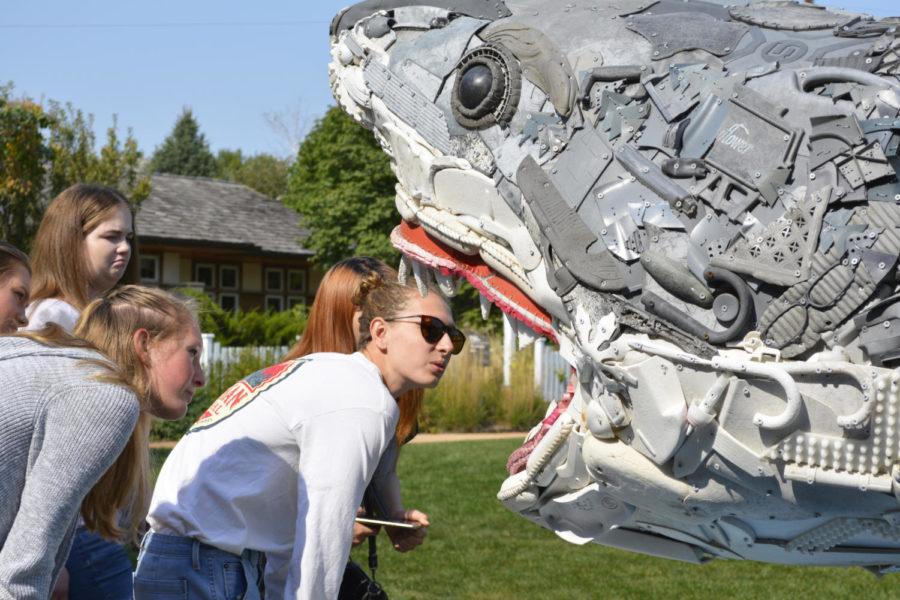Plastic pollution at the forefront of Reiman Gardens sculptures
Students from an Ames High School art class examine the inside of Greta the Great White Shark’s mouth at Reiman Gardens on Sept. 11. This sculpture is a part of the Washed Ashore Sculpture Exhibit designed by Angela Haseltine Pozzi which uses plastic debris as the main textile.
September 12, 2017
Refuse, Repurpose, Reinvent are the buzz words associated with plastic pollution. Reduce, Reuse, Recycle isn’t enough.
Reiman Gardens showcases a sculpture exhibit that brings those three R’s to life. The Washed Ashore Sculpture Exhibit, obtained by Reiman Gardens in April, utilizes plastic debris as the main textile forming sea creatures to illustrate the affliction of pollution in oceans and waterways.
The Washed Ashore sculptures coincide with the Reiman Gardens 2017 season theme: water. There are 10 different sculptures throughout the garden.
Approximately 300 million pounds of plastic is produced globally each year and less than 10 percent of that is recycled, according to a Reiman Gardens pamphlet.
The majority of plastic ends up in oceans by way of runoff, beach neglect and boat spills.
While plastic pollution may not be seen in Iowa to the extent it would be seen on the coast, the problem still exists.
“For us here in Iowa or even other states in the middle of the country, I think what happens is it’s out of sight out of mind. If we don’t see a direct problem we don’t think that it exists,” said Sara Merritt, education manager at Reiman Gardens.
At Reiman Gardens, the film “Washed Ashore: Art to Save the Sea” was shown every month since the exhibit opened. The film highlights artist Angela Haseltine Pozzi in her process of forming the idea for the sculptures and creating them with volunteer help.
“When I just kept seeing plastic on the beach I just thought ‘what’s going on?’ and I started doing research and realized that people just weren’t seeing it. I needed to get them to see it, and in a way that they could not ignore it,” Pozzi said in the film.
While people at the Reiman Gardens’ film screening admitted they’ve seen plastic pollution, they hadn’t seen it to the extent that was shown along the west coast in the film “Washed Ashore: Art to Save the Sea.”
“It’s scandalous,” said Kitty Fisher, Reiman Gardens member.
This was the second time Fisher attended Reiman Gardens to watch the film. She plans on seeing it when it’s shown again in October.
Fisher found the statistics from the film to be shocking.
A slide in the film read, “According to NOAA [Nathional Oceanic and Atmospheric Administration], an estimated 600 marine species including dolphins, whales, seals and turtles are killed or injured by plastic rubbish every year around the world.”
The audience members listed off ways viewers could reduce the plastic pollution issue. Involving the Ames Community Arts Council, Octagon Center for the Arts, Reiman Gardens and creating a local Washed Ashore chapter were mentioned as solutions.
Taking a page out of Pozzi’s notebook, Reiman Gardens employees began collecting plastic they found in their daily lives to help reduce plastic debris.
Unable to hold any more plastics, five months later with boxes full of food containers, bottle caps and milk cartons, Reiman Gardens had students from Lindsay Wede and Lisa Renze’s art classes at Ames High School take the garbage off their hands.
With the intention to use the plastic as supplies for art projects, the students each left Reiman Gardens with a box or bag loaded with plastics.
Wede cited the Washed Ashore film as inspiring the art classes to be mindful of their waste.
“I really like the idea of conservation and mixing it with art,” Wede said.
While Reiman Gardens employees may not be collecting trash anymore they still focus on being cautious of the waste they produce.
Ceramic plates, ceramic cups and glass cups are used to reduce the consumption of plastic. Sustainable gardening practices are also employed to cut back on the use of water, herbicides and pesticides.
“We can each make a small change in our consumer habits that prevent or help reduce the amount of plastic that ends up in our oceans,” Merritt said.
The Washed Ashore Sculpture Exhibit will remain at Reiman Gardens for the month of October. Another film screening will be shown during October. Reiman Gardens is free to all Iowa State students with a valid ID.

















